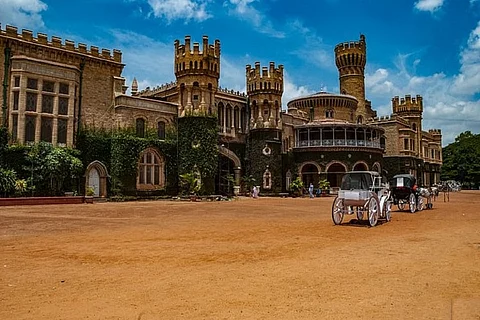

The Karnataka Legislative Council passed the Bangalore Palace (Utilisation and Regulation of Land) Bill, 2025, on Monday, March 10, amid allegations of political vendetta and a walkout by opposition members. The bill aims to address a contempt petition against the state government in the Supreme Court and affirms the state's ownership of 472 acres and 16 guntas of Palace Grounds in Bengaluru. It also attempts to exempt the government from paying Rs 3,000 crore in Transferable Development Rights (TDR) to the Mysuru royal family for 15 acres of land required for road widening on Ballari Road and Jayamahal Road.
Law and Parliamentary Affairs Minister HK Patil, who tabled the bill, explained that the legislation grants the government the authority to decide whether to acquire the palace land for infrastructure projects. "To address traffic congestion on Ballari Road, the government intends to widen the road and needs 15 acres of Bangalore Palace land. For this, over Rs 3,000 crore of TDR was to be given to the royal family," he said. He noted that the compensation demanded would make the project excessively costly. "At Rs 200 crore per acre, if the government agrees to give TDR and widen the road, it will be the costliest road in the world," Patil added.
The bill, introduced to replace an ordinance issued in January 2025, includes an amendment ensuring that any past compensation paid under court rulings remains valid. The bill empowers the government to reclaim sections of the Palace Grounds for infrastructure projects without offering the full compensation previously mandated by the Supreme Court. It outlines that if the state proceeds with the project, it will compensate claimants for the portion of palace land used. The compensation will be calculated based on the guidance value as of November 21, 1996, under the Bangalore Palace (Acquisition and Transfer) Act, 1996. This contradicts the Supreme Court's direction to calculate the value according to the 2023-24 guidance value of the Stamps and Registration Department under Section 45B of the Karnataka Stamp Act, 1957.
The bill also gives the government the power to decide whether to continue or withdraw the project. If the project is dropped, the state will restore possession of the acquired land without compensating the claimants. It also states that any compensation amount will be final, and claimants will have no additional rights to seek further compensation.
In the event of a dispute over compensation, the bill directs the state to deposit the amount with a government-appointed commissioner. The commissioner’s decision will be final, and no claimant can withdraw compensation without presenting a final civil court order.
The bill sparked opposition from BJP members, who walked out in protest, arguing that bypassing the Supreme Court’s ruling undermines judicial authority and sets a dangerous precedent. Leader of the Opposition in the Council, Chalavadi Narayanaswamy, criticised the move, stating that the Mysore royal family had made significant contributions to Karnataka's development. "They have served in all fields, including irrigation, dam projects, electricity, and industry. This is nothing but a political vendetta. The government should first hold talks with the royal family," he said.
Chief Minister Siddaramaiah defended the decision, arguing that complying with the Supreme Court’s compensation order would be financially unviable. He maintained that the palace land should serve public needs while accounting for the state's budget constraints. The bill also includes provisions that protect state government officials and agencies like the BBMP and BDA from legal action for decisions made "in good faith" when the order was implemented.